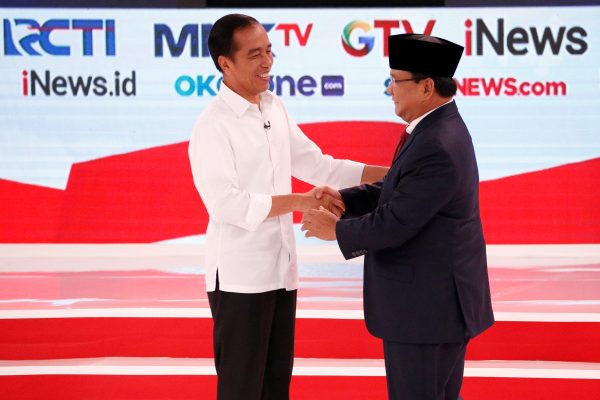The movement mounted a successful campaign to oust former Jakarta governor Basuki Tjahaja Purnama (Ahok), landing him in prison for two years on blasphemy charges. The conservative groups that comprise the 212 movement are now aiming to replace President Jokowi in this April’s presidential election. They are overwhelmingly backing Jokowi’s opponent Prabowo and his vice-presidential nominee Sandiaga Uno (Sandi) as the ideal Muslim candidates.
Since the Ahok campaign, the 212 movement has become an influential phenomenon in Indonesian politics. It is not only encouraging Muslims to express their social, economic and political views and preferences but also making both presidential candidates shift their politics to accommodate Islamic concerns.
Jokowi is attempting to burnish his Islamic credentials. He is now more routinely seen performing Friday prayers and visiting Islamic boarding schools. The appointment of Indonesian Ulama Council chairman Ma’ruf Amin as his vice-presidential running mate is part of this strategy.
While he was raised in a secular family, Prabowo is now developing his network with conservative Islamic activists and groups that endorsed his candidacy. He has amassed backings from conservative activists such as Habib Rizieq Shihab, founder of the Islamic Defenders Front, and Amien Rais, a Muhammadiyah leader and founder of the National Mandate Party.
Prabowo’s running mate Sandi portrays himself as a young and pious Muslim entrepreneur. The Prosperous Justice Party — an Islamist party that also backs Prabowo — describes Sandi as ‘a new santri (devout Muslim) of post-Islamism’.
Conservative Muslims in West Sumatra, North Sumatra, South Sulawesi and North Sulawesi perceive the presidential candidate pairs differently. They consider Jokowi’s effort to enhance his Islamic credentials as ‘too little too late’, having previously criminalised some ulamas (Islamic scholars) who opposed him. While Prabowo is also not considered a good santri, he is closer to these conservatives’ aspirations.
Jokowi’s appointment of Ma’ruf Amin is not enough to convince them. Some prominent clerics in Wajo, South Sulawesi, for example, said they prefer to drink a cup of ‘black coffee with a little sugar’ than ‘milk coffee blended with tea’. The message is that Ma’ruf Amin’s selection does not sufficiently burnish Jokowi’s Islamic credentials. They would rather vote for a young entrepreneur with little political experience like Sandi, even though he is a black coffee with a little sugar (little Islamic credentials).
Members of organisations such as Persatuan Tarbiyah Islamiyah, Wahdah Islamiyah, Darul Istiqamah and Muhammadiyah in West Sumatra and South Sulawesi have similar discontent with Jokowi–Ma’ruf. They perceive Jokowi’s policies as ineffective in dealing with the massive debts and socio-political injustices that poor Muslims suffer from. They also dislike Jokowi’s neo-liberal economic policy that courts foreign investors. He is perceived as a weak president who does not support Muslim aspirations.
For conservatives, defeating Jokowi–Ma’ruf and orchestrating a win for Prabowo–Sandi is an Islamic obligation. They believe that voting for Prabowo is both a spiritual and religious duty, as it is in accordance with the ulama’s political fatwa based on the September 2018 consensus from the Second Ijtima Ulama (Grand Gathering of Ulama).
Rahmat Surya, a local scholar and businessman who pledged an oath to Habib Rizieq, emphasised this during an interview: ‘If I wrongly chose Prabowo–Sandi, my sin is the ulama’s responsibility. However, if I incorrectly choose Jokowi–Ma’ruf, then no one bears my sin, because the ulama did not support them’.
The Prabowo–Sandi pair are not only viewed as best able to address Indonesia’s developmental challenges, but also to pave the way for deeper Islamisation. To aid that cause, they exhort Islamic doctrines such as al-ukhuwah al-Islamiyah (Islamic solidarity) and da’wah (religious preaching) to motivate all Muslims to support Prabowo–Sandi.
Two months ahead of the 2019 presidential election, it is hard to forecast accurately who will win ‘the hearts and minds’ of the people. Some reputable pollsters consistently predict Jokowi–Ma’ruf to be ahead of Prabowo–Sandi by a margin of 20–30 per cent. But for his die-hard supporters, Prabowo’s victory is inevitable unless there is electoral cheating.
Islamic conservatism is becoming more apparent in Indonesia after the 212 movement. These groups constitute not just a socio-religious driving force but also a political one that is changing Indonesia’s political landscape. The case of the Jakarta gubernatorial election and the 2018 regional elections are excellent illustrations of the growing political significance of the 212 movement.
Regardless of who wins the election, the growing tide of Islamic piety (or conservatism to others) in Indonesia will not be a one-off phenomenon. It is having a considerable impact on Indonesian Muslims’ narratives and their political behaviour during the ongoing presidential election. And it may have considerable influence in shaping Indonesia’s public policy well into the future, regardless of who is elected president in April 2019.
Andar Nubowo is an Associate Research Fellow, Indonesia Programme, S Rajaratnam School of International Studies, Nanyang Technological University, Singapore.
A version of this article originally appeared here on RSIS.


This article requires clarification for those who are not familiar with the nuances of Indonesian Islam. Prabowo and his supporters have claimed that incumbent Jokowi does not respect and indeed has “criminalised” the ulama (religious scholars). This is an element of their “black campaign” that relies on hate speech in an effort to undermine Jokowi’s Islamic legitimacy. It is based on lies and distortion. Two points: (1) Individuals that it refers to as ulama, including Habib Rizieq of the Islamic Defenders Front, are under investigation for criminal charges (2) Most Indonesians do not accept Rizieq as an alim (singular of ulama). He is the leader of a violent extremist organization and is commonly referred to as a “gangster in robes.” We need to be very careful to distinguish between propaganda and news in reporting on this election. Repeating propaganda without describing it as such tends the legitimise it.